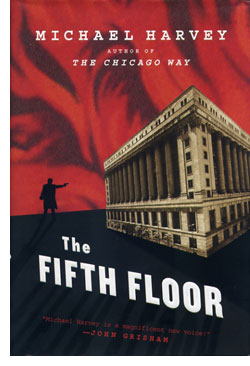 |
 |

Michael Harvey
The Fifth Floor
Reviewed by: Rick Kleffel © 2011
Alfred A. Knopf / Random House
US Hardcover First Edition
ISBN 978-0-307-38629-8
Publication Date: 08-26-2008
278 pages; $23.95
Date Reviewed: 08-21-2011
Index:
Mystery
General Fiction
It's tempting to think that history is but a subset of story; and it's just as appealing to see story as the child of history. Find a way to thread one within the other and readers cannot help but be captivated. It does not have to be as overt as historical fiction. We can find our histories under any rock or even garbage can, if we look closely enough. And nobody looks closer than the classic American private detective.
Michael Harvey's 'The Fifth Floor' is an entrancing mix of history and mystery, but not in the sense that we usually find the two melded. It seems so commonplace to start with, so stripped-down and simple. Michael Kelly, still stinging from the events of 'The Chicago Way,' is approached by an old girlfriend with an abusive husband. She doesn't have to do much more than take off her sunglasses to get Kelly on the case. But while following her husband, who works for "the Fifth floor" of City Hall, that is, the Mayor's office, Kelly finds a body in a house that happens to have a history. Kelly's simple case rapidly becomes more complex than he could have anticipated.
Harvey's second novel is a knockout exploration of dirty politics, the history of Chicago and the moral limits we set for ourselves. As with most mysteries, it is what we don't first notice that matters the most, in this case, Harvey's prose. His sentences are crisp, clean and immensely readable. We're transported into both story and history. Aiding and abetting Harvey's work on a sentence level is his sense of pacing. Laid out in short chapters that seem to be finished before the reader realizes what has happened, 'The Fifth Floor' flows by like an el-train that isn't going to stop before it reaches the final station. For all the stories within stories that you will find here, there's a steel spine that travels from beginning to end without letting the reader go.
Harvey's plotting and sense of story offer the perfect balance of precision and unpredictability. Kelly's investigation rapidly leads beyond the mayor's office, then back into the history of Chicago and the Chicago fire. Harvey knows how to keep readers utterly engaged in past and present plotlines as he inexorably ties them together. The tension is palpable but never overbearing. Sense of scale plays a large part in this novel, as Harvey connects events in the personal lives of his characters to the life of the city itself. He creates a tension with the contrast.
The city itself is an important character in this novel, as Harvey treats readers with an authentic sense of place and time. The cold reality of the 21st century garbage can has a rich, loamy background that Harvey mines with skill. It's an outsize city with an outsize personality; but even Chicago has to work to keep up with those who live there. Michael Kelly, the classically-educated ex-cop, private eye, has a well-wrought edge that make him unpredictably violent. Stir his sense of decency at your own risk. Mayor Wilson of Kelly's Chicago is, for my money, one of the best characters to come out of recent noir fiction. He's as amoral as he needs to be to protect his city and those who live there, a fascinating, frightening man who keeps up with Kelly whenever he steps on stage, and off the page. You'll feel like he's sitting in the room with you, and it won't be comforting feeling.
One of the thrills of 'The Fifth Floor' is the unpredictability not just of Michael Kelly, but Michael Harvey. Harvey writes on a prose level with smooth, sparse precision. His characters are clear and complex. But his plotting is as dangerous as the Mayor of Chicago, and he pushes readers to an edge that is really quite extreme. It's not that his books are particularly violent, but rather that Harvey takes big chances with what happens in the lives of characters we care about. He's the writer equivalent of his own creation. You can't help but respect him. He's willing shove history itself around just to show the reader how much story matters — and to let that story speak for itself.
|
 |
|
|
 |
| |
Review Archive
All Reviews alphabetized by author.
General Fiction
Non-Genre, general fiction and literature.
Horror
Supernatural fiction, supernatural horror and non-supernatural horror.
Science Fiction
Science fiction, science fantasy, speculative fiction, alternate history.
Fantasy
Fantasy, surrealism and magic realism.
Mystery
Crime, thrillers, mystery, suspense.
Non-Fiction
Non-Fiction, True Crime, Forteana, Reference.
Poetry
|
|
 |
|




